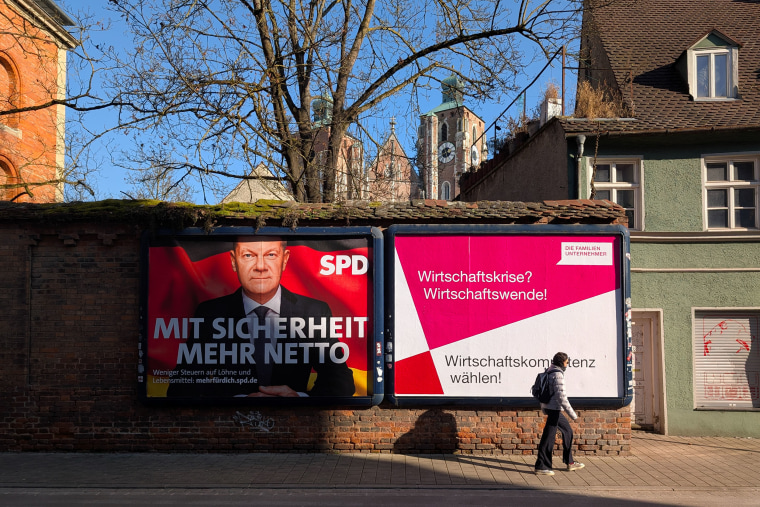Immigration and an ailing economy dominate Germany’s election as far-right eye
BERLIN — German elections usually pride themselves on being reliably boring. Not so this time.
The world’s third largest economy goes to the polls Sunday under the shadow of unusually brusque interventions from the Trump administration in support of the anti-immigration far-right. Meanwhile a spate of high-profile attacks on Germany’s streets, the latest coming Friday at Berlin’s Holocaust memorial, have led to charged campaign debates on immigration.
The favorite to become chancellor is Friedrich Merz, 69, the straight-laced, bespectacled leader of the center-right Christian Democrat Union, or CDU. He has questioned Germany’s future relationship with the United States.
“I hope that it [the U.S] remains a democracy and does not slide into an authoritarian populist system,” Merz told a campaign event in Darmstadt on Thursday. “But it may be that America will enter a longer period of instability and that this populism, this autocratic behaviour of the heads of state, will continue for a longer period of time.”

At home, Merz wants to slash regulatory red tape and corporation tax, while tightening Germany’s borders in what critics say is an attempt to ape his rivals on the hard-right. He is up against incumbent Olaf Scholz, 66, whose center-left Social Democratic Union, or SPD, has struggled to cope with the twin economic crises of pandemic fallout and war in Ukraine.
But undoubtedly the big story is the Alternative for Germany, whose polling figures of 21% would double its support from the last election in 2021, and likely put it in second place. Led by Alice Weidel, 36, the far-right staunchly anti-immigration and anti-Muslim party is under surveilance for suspected extremism by the country’s own domestic intelligence agency.
Germany’s proportional, multiparty system is designed to make it very difficult for one party to win outright, meaning they must work together and govern by coalition. The CDU leads the polls at 28%, SPD languishing at 16%. Robert Habeck, 55, heads the Greens, currently with 13%.
Other parties, such as the socialist Die Linke and pro-business Free Democrats, will hope to achieve the 5% threshold needed to enter the Bundestag.
Polling stations known as “Wahllokale” will open at 8 a.m. and close at 6 p.m. local (2 a.m. — noon ET) on Sunday. Shortly afterward, an exit poll will drop that has historically given an accurate idea of the final results. Over the coming hours, overnight into Monday morning, the results themselves will trickle in.
Most eyes will be on the AfD. Its rise is part of a Europe-wide trend alarming liberals and centrists, whereby once-fringe nationalist parties are making striding gains across the continent at the expense of the political establishment.
“We think it’s unthinkable that fascism could return to Europe, but it has — it’s here,” said Marina Weisband, a prominent activist, author and psychologist. “The established parties have no answers,” added Weisband, founding director of Aula, a project to strengthen democracy education in German schools. “What the parties in Germany mostly do is just keep the system running. But the system itself doesn’t work that good anymore.”
As with several of these nationalist European movements, the White House has established ties with the AfD, which has been endorsed by Trump adviser Elon Musk and Vice President JD Vance.
Andreas Busch, a professor of political science at the University of Göttingen, believes that as striking as these interventions have been, they have not boosted the AfD’s domestic polling.
“It has not moved the needle one bit,” he said. “They have slowly but surely crept up in the opinion polls,” he added. “And that has been going on for a long time before Musk has said anything.”
The AfD rejects labels such as far-right and fascist. “It’s bulls—,” Marc Bernhard, one of its lawmakers told NBC News at a rally in Karlsruhe this week. The White House and AfD leader Weidel did not respond to requests for comment on their relationship or policies and rhetoric of the party.
The AfD’s rise is particularly striking in Germany, a country so wary of its own Nazi past that it has laws and informal political pacts intended to stop fascism’s return. One of these is the “firewall” — an agreement by parties not to work with far-right parties such as the AfD. That’s why it’s unlikely the party will enter any coalition following the vote, even if it polls strongly.
“Nobody expects the AfD to form a government this election,” Busch said. “So it’s difficult to assess how seriously they should be taken.”
These…
Read More: Immigration and an ailing economy dominate Germany’s election as far-right eye

